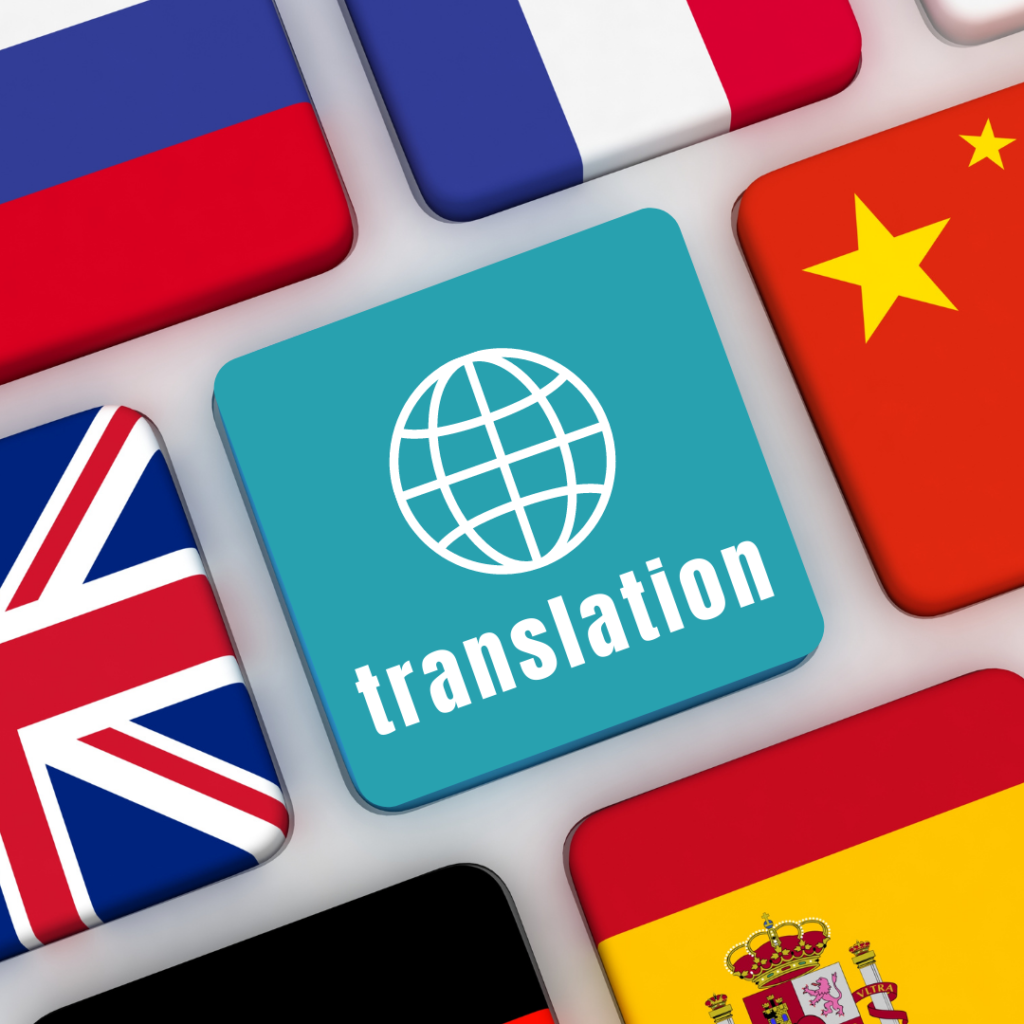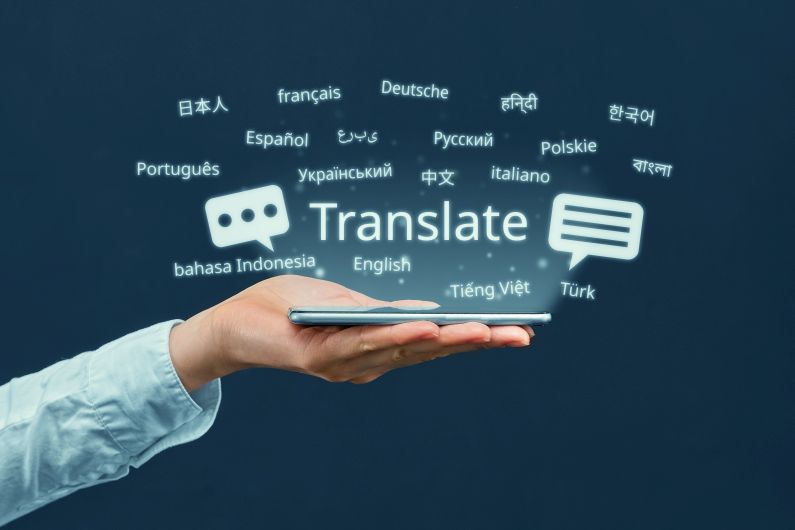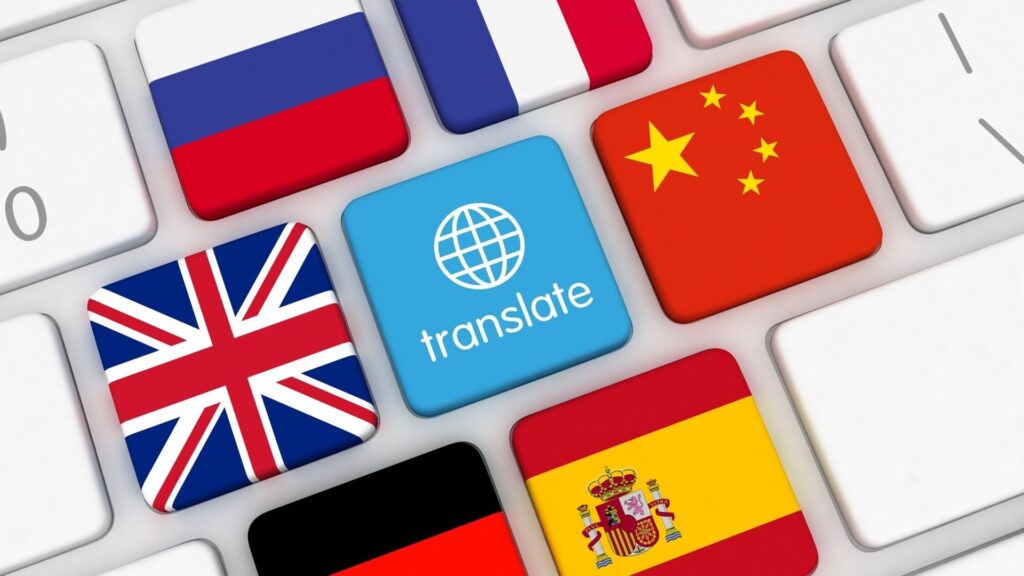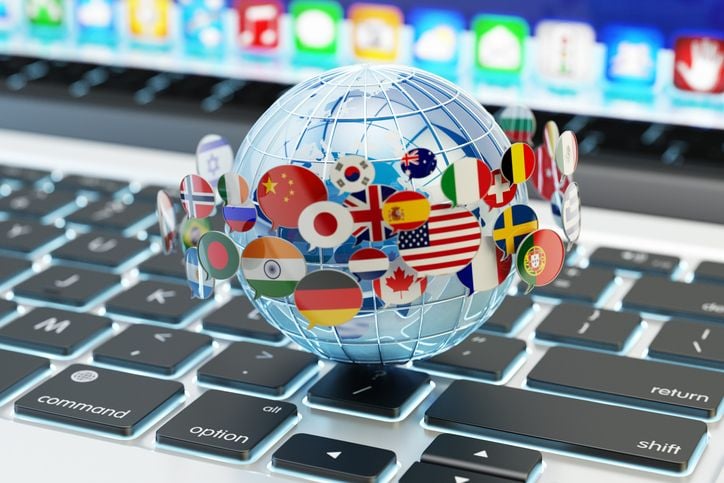Послуги перекладу play a crucial role in bridging the language barrier that exists in our increasingly globalized world. In an era where communication is key, the need for accurate and reliable translations has never been more important. Whether you are a multinational corporation seeking to expand your global reach or an individual navigating the complexities of a foreign language, Translation Services provide the expertise and solutions to ensure effective communication across borders. With a team of skilled linguists and cutting-edge technology, these services offer a wide range of language solutions to meet your diverse requirements. From document translation to localization, interpretation, and transcription, Translation Services are committed to delivering accurate and culturally sensitive translations that enable seamless communication in a global context.

Benefits of Translation Services
Translation services play a crucial role in today’s globalized world, offering a wide range of benefits to businesses and individuals alike. By breaking down language barriers, translation services enable effective communication, facilitate international expansion, and foster cultural exchange. Here are some key benefits:
Increased Global Reach
Translation services allow businesses to reach a broader audience by overcoming language barriers. By translating their content and materials into multiple languages, companies can tap into new markets and expand their customer base globally. This increased reach can lead to higher sales, greater brand recognition, and a competitive edge in the international marketplace.
Improved Accessibility
Translation services also enhance accessibility by making information available to individuals who do not speak the language in which it was originally written or spoken. This is particularly important in sectors such as healthcare, legal, and government, where accurate understanding and effective communication are vital. By providing translated versions of documents, websites, and other resources, translation services enable better access to essential information and services for diverse language communities.
Enhanced Customer Satisfaction
In a globalized business environment, customer satisfaction is paramount. By offering content and support in customers’ native languages, businesses can build stronger relationships and trust. This personalization demonstrates respect for the customer’s language and culture, leading to improved customer satisfaction and loyalty. Translation services ensure that customers can understand product information, user manuals, marketing materials, and customer support resources accurately, resulting in higher customer engagement and retention.
Culturally Sensitive Communication
Translation services go beyond simple language translation; they also focus on cultural sensitivity. Effective communication involves understanding the cultural nuances and adapting the message accordingly. Localization services offered by professional translators ensure that the content is not only accurately translated but also tailored to the target culture, taking into account idioms, local customs, and cultural sensitivities. Culturally sensitive communication builds trust, avoids misunderstandings, and strengthens relationships with diverse audiences.
Types of Translation Services
Translation services encompass a wide range of specialized disciplines to cater to different industries and contexts. Here are some common types of translation services:
Document Translation
Document translation involves translating written content such as legal contracts, marketing materials, user manuals, medical reports, and other types of documents. Professional translators ensure accurate and contextually appropriate translation while maintaining the integrity of the original content.
Локалізація веб-сайтів
Website localization involves adapting a website’s content, design, and functionality to suit the linguistic, cultural, and regional preferences of the target audience. This includes translating website content, adapting images and graphics, and ensuring usability and navigational elements are culturally appropriate.
Certified Translation
Certified translation refers to the translation of documents that require an official certification or notarization for legal or official purposes. This is often required for documents such as legal contracts, birth certificates, academic transcripts, and patents.
Audiovisual Translation
Audiovisual translation deals with translating and adapting content in multimedia formats such as videos, films, documentaries, and presentations. These translations may require subtitling, dubbing, voice-over, or transcription services, depending on the medium and target audience.
Legal Translation
Legal translation involves translating legal documents such as contracts, court documents, regulations, and legal correspondence. Translators must have expertise in legal terminology and understand the legal systems and conventions of the source and target languages.
Medical Translation
Medical translation involves translating medical texts, clinical trial protocols, patient records, packaging and labeling of pharmaceutical products, and other healthcare-related documents. Accuracy, precision, and understanding of medical terminology are of utmost importance in this specialized field.
Technical Translation
Technical translation focuses on translating technical documents such as user manuals, engineering specifications, patents, and scientific research papers. Translators in this field must possess in-depth knowledge of the subject matter, industry-specific terminology, and specialized writing conventions.
These are just a few examples of the many types of translation services available, and each requires specific expertise and knowledge in the respective field.
Choosing the Right Translation Services Provider
Selecting the right translation services provider is crucial to ensure accurate and high-quality translations that meet your specific needs. Here are some key factors to consider when choosing a translation services provider:
Industry Experience
Look for a translation services provider with experience in your industry or field. Different industries may have specific language requirements, terminology, and regulatory guidelines. A provider with expertise in your industry will have a better understanding of these nuances and can provide accurate translations.
Quality Assurance Measures
Ensure that the translation services provider has rigorous quality assurance processes in place. Look for certifications like ISO 17100, which establish standards for translation quality. The provider should have a team of professional translators who are native speakers of the target language and have subject matter expertise.
Language Expertise
Check if the translation services provider has translators who are fluent in the source and target languages you require. Language expertise is critical to ensure accurate and culturally appropriate translations. The provider should have a pool of skilled translators who specialize in various languages.
Turnaround Time
Consider the turnaround time offered by the translation services provider. Timely delivery of translations is essential, particularly if you have urgent deadlines. Discuss your project timelines with the provider to ensure that they can meet your requirements.
Confidentiality and Security
Data privacy and confidentiality are paramount when dealing with sensitive information. Ensure that the translation services provider adheres to strict confidentiality protocols and has secure processes in place to protect your data.
Cost-effective Solutions
Consider the cost-effectiveness of the translation services provided. While price should not be the sole determining factor, it is essential to find a balance between quality and cost. Compare quotes from different providers and consider factors such as translation processes, project management support, and value-added services offered.
By evaluating these factors, you can select a translation services provider that aligns with your specific requirements and ensures high-quality translations tailored to your industry and target audience.
How to Request Translation Services
When requesting translation services, it is essential to provide clear instructions and understand the process involved. Here are the steps to follow:
Identify Translation Needs
Determine what materials or content you need to be translated. This could include documents, website content, marketing materials, audiovisual content, or any other relevant resources.
Gather and Prepare Source Materials
Collate all the source materials that need to be translated. Ensure that the materials are complete, well-organized, and in a suitable format for translation. Providing reference materials such as glossaries, style guides, and previous translations can also be helpful.
Determine Target Languages
Decide on the languages into which you want the content to be translated. Consider your target audience and their language preferences. If you are unsure, a professional translation services provider can offer guidance based on their expertise and market knowledge.
Communicate Project Requirements
Clearly communicate your project requirements and expectations to the translation services provider. This includes details such as desired delivery timelines, preferred terminology, formatting guidelines, and any specific instructions.
Request Quote and Timeline
Request a detailed quote and timeline from the translation services provider. This should include the cost of the translation, any additional services required (such as proofreading or desktop publishing), and the estimated delivery date. Review the quote and seek clarification if needed.
Review Translation Output
Once the translation is complete, review the output for accuracy, clarity, and adherence to your requirements. Make sure that the translated content retains the intended meaning while being culturally appropriate for the target audience.
Provide Feedback and Revisions
If any revisions or changes are necessary, provide detailed feedback to the translation services provider. Clear and timely communication will help in achieving the desired final result.
Evaluate and Establish Long-term Partnership
After the translation project is complete, assess the overall performance of the translation services provider. Consider factors such as quality of translations, communication, adherence to deadlines, and customer support. If you are satisfied with the provider’s services, consider establishing a long-term partnership for future translation needs.
By following these steps, you can ensure a smooth and efficient translation process that meets your needs and delivers high-quality translations.

The Role of Technology in Translation Services
Technology has significantly impacted the translation services industry, improving efficiency, accuracy, and cost-effectiveness. Here are some key technologies and tools used in translation services:
Translation Memory
Translation memory is a database that stores previously translated segments of text, allowing translators to reuse these translations in future projects. This technology helps maintain consistency, improves productivity, and reduces translation costs, especially for repetitive content.
Machine Translation
Machine translation (MT) uses algorithms and artificial intelligence to automatically translate text from one language to another. While the quality of machine translation has improved, it still requires human post-editing to ensure accurate and contextually appropriate translations. MT is beneficial for large volumes of content, providing a starting point for human translators.
Computer-Assisted Translation (CAT) Tools
CAT tools are software programs designed to assist human translators in the translation process. These tools offer features such as translation memory, terminology management, automated quality checks, and workflow management. CAT tools streamline the translation process, improve consistency, and enhance translator productivity.
Terminology Management
Terminology management involves creating and maintaining a centralized database of industry-specific terminology to ensure consistency across translations. Terminology management tools help translators access approved terminology and apply it consistently throughout the translation project.
Quality Assurance Tools
Quality assurance tools automate checks for linguistic, grammatical, and formatting errors in translations. These tools help improve translation accuracy, consistency, and adherence to style guidelines. They also facilitate the review process by flagging potential issues for translators and proofreaders to address.
Project Management Software
Project management software helps streamline the translation workflow by facilitating collaboration, monitoring project progress, and managing deadlines. These tools enable efficient communication between translators, project managers, and clients, enhancing overall project efficiency.
Technology continues to evolve and play a critical role in the translation services industry. While these tools and technologies enhance efficiency and productivity, it is important to note that they work in conjunction with the expertise and judgment of professional human translators.
Challenges and Solutions in Translation Services
Translation services face several challenges in delivering accurate and culturally appropriate translations. Here are some common challenges and the solutions employed:
Language Complexity
Languages differ in structure, grammar, syntax, and cultural context, making translation a complex task. Translators must have a deep understanding of both the source and target languages to accurately convey the nuances and meaning. Overcoming language complexity requires skilled translators with subject matter expertise and industry-specific knowledge.
Cultural Nuances
Cultural nuances can significantly impact the meaning and effectiveness of translations. Translators need to understand the cultural context of both the source and target languages to ensure accurate and culturally appropriate translations. Solutions include employing native speakers with cultural knowledge and utilizing localization techniques to adapt content for the target culture.
Subject Matter Expertise
Translating specialized or technical content requires subject matter expertise. Translators must be familiar with industry-specific terminology, concepts, and conventions to accurately convey the intended meaning. Collaboration with subject matter experts and ongoing professional development helps ensure accurate and domain-specific translations.
Maintaining Consistency
Maintaining consistency across translations is crucial for branding, accuracy, and user experience. Translation memory and terminology management tools play a key role in achieving consistency by reusing translations and adhering to approved terminology. Clear style guides and guidelines also aid in maintaining consistency throughout the translation project.
Handling Urgent Deadlines
Urgent deadlines can put pressure on translation services providers and translators. Planning and effective communication are essential to managing urgent translation requests. Prioritizing urgent projects, allocating sufficient resources, and collaborating closely with clients can help meet tight deadlines without compromising quality.
Dealing with Confidential Information
Translation often involves handling sensitive and confidential information. Translation services providers must have strict confidentiality protocols in place to protect client data. Non-disclosure agreements and secure communication channels are employed to maintain confidentiality and adhere to data protection policies.
By understanding and addressing these challenges, translation services providers can deliver accurate, culturally appropriate, and high-quality translations to meet client needs.

Translation Services for Specific Industries
Translation services cater to various industries, each with unique requirements and language demands. Here are some examples of industry-specific translation services:
Medical and Healthcare
Medical and healthcare translation services include translating medical manuscripts, clinical trial protocols, patient records, informed consent forms, medical device documentation, and pharmaceutical labeling. Accuracy, clarity, and adherence to regulatory guidelines are critical in this industry to ensure patient safety and effective communication.
Legal and Law Enforcement
Legal and law enforcement translation involves translating legal contracts, court documents, witness statements, police reports, and immigration documents. Translators must have a deep understanding of legal terminology and systems, ensuring accurate and legally valid translations.
Business and Finance
Translation services for the business and finance sectors cover a range of documents, including financial reports, business plans, investor relations materials, contracts, and marketing collateral. Translators in this field must possess knowledge of financial terminology, business practices, and industry conventions.
Technology and IT
The technology and IT industry require translation services for product manuals, software documentation, website content, user interfaces, and technical specifications. Translators must have expertise in technical terminology, keeping up with the latest industry trends and innovations.
Маркетинг та реклама
Translation services in the marketing and advertising field involve translating marketing campaigns, advertising materials, social media content, product descriptions, and website content. Translators must adapt the message to the target audience while maintaining brand tone and style.
Travel and Tourism
Travel and tourism translation services cover a wide range of materials, including travel guides, brochures, hotel websites, menus, and tourist information. Translators in this field must have cultural awareness and expertise in the tourism industry to effectively communicate with international travelers.
These are just a few examples, and translation services are available for many other industries. Industry-specific translation services ensure accurate and tailored translations that meet the unique demands and requirements of each sector.
The Importance of Professional Human Translators
While technology plays a significant role in translation services, the importance of professional human translators cannot be overstated. Here are some reasons why professional human translators are essential:
Language Proficiency
Professional human translators have a deep understanding of both the source and target languages. They possess native or near-native proficiency, ensuring accurate and idiomatic translations. Human translators consider cultural nuances, idioms, and contextual understanding, producing translations that accurately convey the intended meaning.
Cultural Knowledge
Translators with cultural knowledge can ensure that translations are culturally appropriate for the target audience. They understand the customs, traditions, and societal norms of both the source and target cultures, enabling them to adapt the content such that it resonates with the target audience.
Contextual Understanding
Human translators have the ability to understand the context of the content being translated. This includes understanding the purpose of the document, the intended audience, and any underlying messages or implications. Contextual understanding helps ensure accurate translations that effectively convey the desired message.
Accuracy and Tone
Professional human translators go beyond word-for-word translation; they capture the tone, style, and intent of the original content. They possess the ability to adapt the language, style, and register appropriately to suit the target audience. This nuance is crucial for marketing materials, branding, legal documents, and any content that requires accurate representation.
While technology can aid in the translation process, it is the expertise, judgment, and linguistic proficiency of professional human translators that ensure the highest quality translations.

Translation vs Interpretation
Translation and interpretation are both vital language services, but they involve different skills and scenarios. Here are the definitions, differences, skills, and qualifications involved in each:
Definition and Differences
Translation refers to the written conversion of text from one language to another, capturing the meaning and conveying it accurately. It involves working with written materials such as documents, books, websites, and other texts.
Interpretation, on the other hand, involves the oral conversion of spoken language from one language to another in real-time. Interpreters work with live conversations, speeches, conferences, and events where immediate translation is required.
Skills and Qualifications
Both translation and interpretation require excellent language skills and cultural knowledge. However, there are distinct skills and qualifications that each field requires.
Translators need strong writing skills, attention to detail, research abilities, subject matter expertise, and proficiency in both the source and target languages. They often hold degrees or certifications in translation or related fields to demonstrate their proficiency and expertise.
Interpreters need exceptional listening and speaking skills, a quick thinking process, multitasking abilities, cultural sensitivity, and strong memory recall. They often receive specialized training in simultaneous or consecutive interpretation techniques and possess excellent public speaking and interpersonal skills.
Use Cases
Translation is typically used for written content, allowing for careful editing, proofreading, and revision. It is commonly used for documents, contracts, books, websites, marketing materials, and any content that requires accurate and detailed conversion from one language to another.
Interpretation, on the other hand, is used in situations where real-time communication is necessary. This includes conferences, business meetings, legal proceedings, medical appointments, and diplomatic events. Interpreters are present to ensure effective communication between individuals or groups speaking different languages.
Both translation and interpretation play essential roles in bridging language barriers, facilitating effective communication, and promoting understanding in diverse contexts.
Future Trends in Translation Services
As technology advances and global interactions increase, translation services continue to evolve. Here are some future trends that are shaping the translation services industry:
Artificial Intelligence and Neural Machine Translation
Artificial Intelligence (AI) and Neural Machine Translation (NMT) are revolutionizing the translation process. AI-powered tools analyze vast amounts of language data to improve translation accuracy and speed. NMT models, trained on large bilingual datasets, produce more natural and contextually accurate translations.
Increased Language Support
As businesses expand their global reach, the demand for translations in less widely spoken languages is increasing. Translation services providers are extending language support to meet these needs, utilizing language specialists, and leveraging technology to offer translations in a diverse range of languages.
Integration of Translation Services in Various Platforms
Translation services are increasingly being integrated into various platforms to facilitate real-time translation. This includes embedded translation tools in web browsers, instant messaging apps, e-commerce platforms, and content management systems. The integration of translation services enhances accessibility and eliminates language barriers for users.
Demand for Specialized Translators
The demand for specialized translators is on the rise. Translators with expertise in specific industries, such as healthcare, legal, finance, or technology, are sought after to ensure accurate and domain-specific translations. Specialized translators possess in-depth knowledge of industry terminology, regulations, and best practices.
Rise of Remote Interpretation Solutions
Remote interpretation solutions are gaining popularity, particularly in global events and multilingual conferences. Remote interpretation eliminates travel costs and logistical challenges. With the advancement of technology, remote interpreting platforms enable seamless, real-time interpretation, fostering cross-cultural communication without geographical limitations.
These trends highlight the ongoing transformation in the translation services industry, driven by technological advancements, increased language diversity, and evolving client needs. As businesses continue to operate in a globalized world, translation services will play a vital role in breaking down language barriers and facilitating effective communication.




